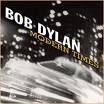We also haven’t come upon any new musical novels lately, though we did recently read and love Zadie Smith’s On Beauty and also Cormac McCarthy’s No Country for Old Men.
 But what I’d like to write about here is the new Dylan album, Modern Times. The central idea to Coral Press is that novels can be written about music, but also that enduring literature can take the form of great music, and perhaps no one exemplifies that better than Bob Dylan. (In our less restrained moments we’ve been known to call Dylan our own Shakespeare—or at least our own Lord Byron.)
But what I’d like to write about here is the new Dylan album, Modern Times. The central idea to Coral Press is that novels can be written about music, but also that enduring literature can take the form of great music, and perhaps no one exemplifies that better than Bob Dylan. (In our less restrained moments we’ve been known to call Dylan our own Shakespeare—or at least our own Lord Byron.)And we’re crazy about Modern Times; think it’s the Bobster’s best record since Blood on the Tracks. After the triumph of Chronicles—far and away the best book any rock figure has written or ever will write as an autobiography—we’re inclined to trust Dylan on all matters, and so even when a line or conceit on Modern Times might appear slapdash, we’re happy to look for connection; and connections abound. The whole record seems, especially during a 4 a.m. insomnia-drenched headphone listening to the album, to connect in every possible way: not only from song to song, line to line, but also as far back in the past as possible, and yet to the daily newspapers or newsblogs that riddle our consciousnesses.
The line that we come back to is: “I wanna be with you in paradise /And it seems so unfair / I can't go to paradise no more / I killed a man back there” with its wit, surprise, hint of the Old Testament yet and touchstone to contemporary religious extremism. Oh, and the line about playing in a cowboy band always brings a chuckle. And ... if the whole album is no more than a shout-out to Alicia Keyes, and all that that implies -- well, that’s kinda great, too.
But the reason we’re talking about Modern Times here is that it’s a piece of music that does what great literature does: Makes your head explode. You come away from a listen to the record as you leave a good book, full of rich ideas you almost can make sense of, a feeling of world-shaking meaning almost grasped, a plethora of characters with their quirky charms, and overall, the vivid delights of being guided by the hand of a true visionary artist.
Oh, and not often commented on: The record is beautifully produced (bravo, Jack Frost, whoever you are); lusciously played; and masterfully sung. There’s as much meaning and richness in Dylan’s voice and phrasing as in Sinatra at his wisest and most experienced. Dylan hardly needs us to say that he's a genius; but of course he is, and we feel lucky to be alive when he is.

